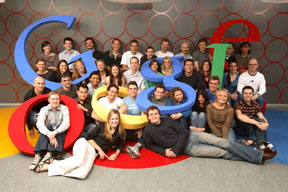People love-to-love Google – it is an aspirational employer, which is always topping the ‘best places to work’, lists here and in the US with its commitment to work spaces.
Today at the Optus Business Technology Seminar however, I learned more about Google’s commitment to workplaces – work can and does happen everywhere and anywhere. Google itself does not have enough desks for the number of people who are employed by it. There is a fundamental shift on what work looks like and where it takes place.
A few facts: Google is the 4th largest server manufacturer in the world (and they have never sold one) – also they are the 3rd largest IP network in the world…
Interesting to listen to Stuart McLean Head of Enterprise in Australia and NZ as he shared how Google’s purpose to ‘Organize and manage the worlds information’ drives its innovation and product development. Included in that is the Google Enterprise, established to support businesses organize and manage the businesses information – As Stuart pointed out much of the planets information is still housed on people’s hard drives… (Google can’t help manage or organize it if it stays on those hard drives.)
Google has come up with the notion of ‘100% web’ – which means that information is stored remotely on massive servers, but can be accessed from any device anywhere – if the device gets destroyed – it does not matter because the real value is in the data – which is remote so not destroyed. A PC, smartphone, tablet all they are is an access mechanism to the data. This by definition is what cloud computing is all about.
“Work is not a place it’s a thing you do – and you can do it anywhere.” Apparently 85% of new jobs created between 1998-2006 are involved in knowledge work of some sort – like problem solving or connecting people.
The workspace – is transformed to a place where people come together to connect ‘the tribe’s place’. “Telecommuting can reduce a businesses real estate costs by 20% and payroll by 10%” he quoted.
As the notion of how work takes place evolves – then I believe that the investment made in ensuring people are connected, aligned and have a shared sense of purpose is critical to peoples well being. The challenge for organizations is how to celebrate peoples contribution, recognize them and also to recognize teams – when they may be dispersed across the globe.
As the world becomes smaller “in the future each and every job will be completed by people from around the world” [The world is flat] – as we can see with the massive growth in businesses like freelancer.com 
Stuart summarized:
- Innovation is not installed
- Attachments are so last century
- Think mobile first
- Team effort and collaboration is the future
- Manage the information coming at you – cleverly
- Relationships not contacts
One thing I do know is that the work places my children enter will be vastly different than the places I started my career – ‘so last century’




Ray Keefe says
Great post Naomi,
The nature of work could be radically changed by the information age. Vernor Vinge explored this in his book “Rainbows End” where work consisted of projects. You picked which projects to join (affiliate with) and negotiated a rate for your contributions toward a solution. A projects could have 100,000 people affiliated with it and only a few making serious contributions at any one time, but the synergy allowed solutions to be developed that were not possible in small teams.
This is like the ultimate open innovation process in action.
And in this world, set only 20 years in the future, a large company had 3 direct employees.
It is deliberately radical in it’s exploration of the topic but i found the knowledge based work concepts. leveraged by high speed interactive Internet and wearable computers, to be very thought provoking.
Ray Keefe
Successful Endeavours